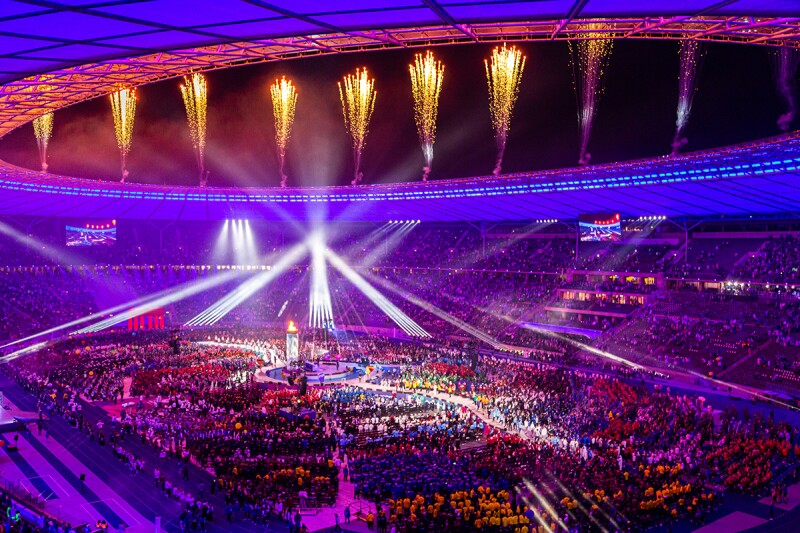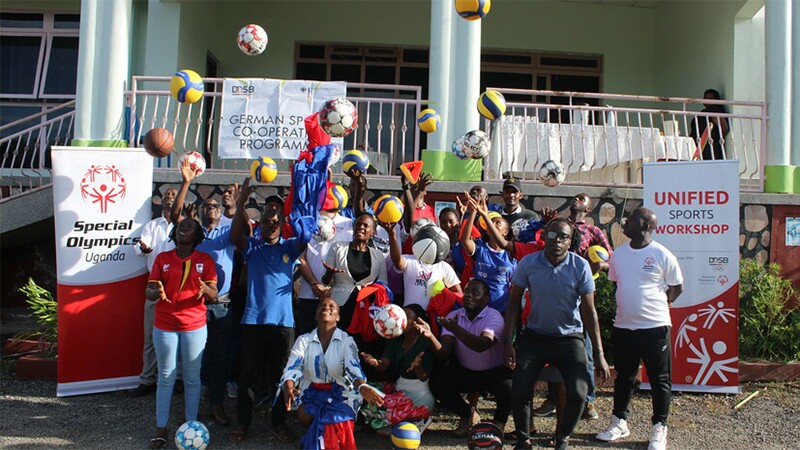
Stronger Together—The Power of World Games
To coincide with the one-year celebrations, a global webinar ‘Stronger Together—The Power of World Games was hosted by Emanuelle (Manu) Dutra Fernandes de Souza, Special Olympics Brazil athlete and Special Olympics International Board Member.
The webinar featured a presentation from Sven Albrecht, managing director of Special Olympics Germany, and CEO of the World Games, showcasing how the Games have helped to transform Germany. In Berlin, post-event research shows that the levels of public awareness for Special Olympics have almost doubled, compared with before the Games.
In a live interview from the iconic Brandenburg Gate in Berlin, a webinar audience of 350 representing 90 countries, also heard from Louis Kleemeyer, a Special Olympics Germany athlete leader who worked as an inclusion manager on the Berlin Games, and Natascha Wermelskirchen who was the first German Torch runner at the Games, about how the Berlin Games have positively impacted their lives, and German society.
There was also a panel discussion featuring some of the ongoing Berlin Games legacy projects that have been put in motion to create more opportunities for athletes with intellectual disabilities around the world. The webinar heard from Tobias Antoni from the German Olympic Sports Federation, and Susan Masila from Special Olympics Africa about how a Unified Sports coach training project running across four African countries (Uganda, Burundi, Tanzania, Kenya) came to life thanks to the Berlin Games.

The growing scale and impact of the Global Leadership Coalition for Inclusion, a pioneering legacy project launched at the Berlin Games that sees national governments and Special Olympics Programs commit to improving education and inclusive sport opportunities in schools together, also featured.
Florette Blackwood, Senior Strategist on Sport and Gender, with Jamaica’s Ministry of Culture, Gender, Entertainment and Sport said the Jamaican Government was proud to be a committed leader in inclusion and encouraged more nations to sign-up to the Global Coalition.
Ivan Radovic, National Director of Special Olympics Montenegro, also explained how working in partnership with the Government of Montenegro is enabling 3,000 school children, with and without intellectual disabilities, to play Unified Sports together.

Finally, the webinar audience watched the inspiring story of Special Olympics Bharat athlete Vignesh Naik who experienced hearing for the very first time at the Berlin Games when he was fitted with a hearing device at the Special Olympics Healthy Athletes® Healthy Hearing program. Supported by his coach, Sheetal Negi, and mentor, Cyril Lopes, Vignesh revealed that his life has been transformed and his sporting performances have improved now that he can finally hear.
Brandon Sawalich, CEO of Starkey, a long-time partner of Special Olympics who served as the Berlin Games exclusive Hearing Health partner, rounded out the panel, explaining that supporting Special Olympics athletes and making healthy hearing services available to even more athletes worldwide is a major priority for Starkey.
World Games Berlin Media Awareness Report
Meanwhile, a new report, which draws on data from across the global movement, shows that the Berlin Games generated 72 billion media impressions across multiple mediums covering international and domestic media coverage.
The official Media and Awareness report for the Berlin Games was compiled by Special Olympics International with contributions from the Berlin Local Organizing Committee, Nielsen Sports as well as each individual Regional Communications team. The report demonstrates how the Games reached new heights in media awareness and coverage.
Through our exclusive host broadcast partnership with ESPN, the Opening Ceremony of the Games was broadcast live to millions of viewers in the US through ESPN networks and syndication, reaching more than 190 countries worldwide, marking the broadest reach ever for a Special Olympics World Games Opening Ceremony.
In another first for the Berlin Games, the eleven largest sports reporting media companies in Germany joined forces to jointly cover the event. The alliance was a significant factor in raising awareness of Special Olympics with news reports from the Games reaching 70% of the TV audience in Germany.

Special Olympics also partnered with the European Broadcasting Union (EBU) to deliver Games-time content to their members across Europe, and through global affiliates. Additionally, a new initiative saw the establishment of the European Media Broadcast Unit, led by Special Olympics Europe Eurasia and Restless Films. Operating as a dedicated news source, this team of 12 reporters, camera operators and editors produced more than 800 customized sport news highlights packages comprised of 25 hours of edited material, featuring each of the 56 delegations from across the region.
The Special Olympics World Games Berlin 2023 was the largest inclusive sports event in 2023, with 6,500 Special Olympics athletes and Unified partners from 176 delegations, 3,000 coaches, 18,000 volunteers, participating.
Nearly 100,000 ticketed spectators and more than 330,000 World Games attendees witnessed inclusion in action over the course of the Games. Over 50,000 people attended the Opening Ceremony and a record breaking 1,800 international media registered for these Games from 90 countries, the largest number of media to ever attend and cover a Special Olympics World Games. During the 9-day event, athletes competed in 26 Olympic-style sports at 9 venues across the city of Berlin.


